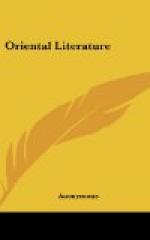Meanwhile one of the horsemen of the tribe of Fazarah said to his neighbors: “Kinsmen, you may rest assured that there is going to be a breach between the tribe of Abs and that of Fazarah, as a result of this race between Dahir and Ghabra. The two tribes, you must know, will be mutually estranged, for King Cais has been there in person; now he is a prince and the son of a prince. He has made every effort to cancel the bet, but Hadifah would by no means consent. All this is the beginning of a broil, which may be followed by a war, possibly lasting fifty years, and many a one will fall in the struggle.”
Hadifah hearing this prediction, said: “I don’t trouble myself much about the matter, and your suggestion seems to me absurd.” “O Hadifah,” exclaimed Ayas, “I am going to tell you what will be the result of all your obstinacy towards Cais.” Then he recited some verses, with the following meaning: “In thee, O Hadifah, there is no beauty; and in the purity of Cais there is not a single blot. How sincere and honest was his counsels, although they were lacking in prudence and dignity. Make a wager with a man who does not possess even an ass, and whose father has never been rich enough to buy a horse. Let Cais alone; he has wealth, lands, horses, a proud spirit, and he is the owner of this Dahir, who is always first on the day of a race, whether he is resting or running—this Dahir, a steed whose feet even appear through the obscurity of night like burning brands.” “Ayas,” replied Hadifah, “do you think I would break my word? I will take the camels of Cais, and will not permit my name to be inscribed among the number of those who have been vanquished. Let things run their course.”




